
Jon Anderson: “One day I’ll do serious prog rock and it will be heavy duty rock and roll” Pic: Cathy Miller
The Yes frontman and serial collaborator talks about long-distance co-writing, the changing interpretation of prog rock and singing about politics
Founding member and frontman of prog rock behemoths Yes, Jon Anderson’s instantly recognisable vocals have been central to the creation of some of the most popular music in the genre’s canon. During his three spells in the band – which ended in 2009 with Magnification – Yes released a dozen albums including the iconic early 70s masterpieces The Yes Album and Close To The Edge as well as the poppier 90125, which spawned the group’s biggest hit Owner Of A Lonely Heart. Alongside bandmates such as Chris Squire, Rick Wakeman, Steve Howe and many others, Anderson’s legacy is an enduring one.
Outside of Yes he has been equally prolific, working with the likes of virtuoso violinist Jean-Luc Ponty, reuniting with Trevor Rabin and Rick Wakeman (as ARW) and with his current collaborator the frontman of The Flower Kings, Roine Stolt to further explore the boundaries of progressive music. Brought together by Inside Out Music owner Thomas Waber, Anderson and Stolt have recorded the sonically expansive Invention Of Knowledge.
We caught up with Jon in his Californian studio to have a chat about his latest project and take a quick look back over his career…
How are things?
“Everything is wonderful. I’m in my studio at the moment going through stuff and it’s a busy day musically. There’s always something great evolving, technology is moving very fast and life is good.”
Can you explain the part technology played on Invention Of Knowledge?
“Basically, we worked through the internet. I sent Roine some songs that I liked very much from a few years ago which could be put together and could interweave with each other. I then asked Roine to create the music that he was hearing in those songs and to try out some ideas. Certain parts of the songs could then be repeated as it would be interesting to hear them later in the album.”
Was it then a surprise to hear how it sounded when the songs were returned to you?
“Surprised a little bit, but more or less happy that he understood how to evolve the pieces. Inventioning was a piece of music I wrote with a friend of mine who lives in Liverpool called Neil Campbell. It was a string quartet performance and I wrote the song on top of it thinking that I would love to do an installation in a museum, using the music and presenting visualisations of all the inventions that have happened and all the inventions that are coming forward. I thought it would have been a great installation, but it never happened.
“I sent it to Roine and he put some beautiful music on it, more progressive rock and roll/progressive energy music and it all seemed to fit. He did that with every song and it was just one of those things, you’re working with somebody on the other side of the world but you’re still on the same planet so it’s okay. We were listening to ideas and he would send me some music and I would suggest that he shortened this or lengthened that. He is very connected to wanting to create a good piece of music and that was the first and foremost idea, to create a very good piece of music that people are going to enjoy.”
Do you think that geographical distance had any effect on the writing?
[cc_blockquote_right] THERE ARE PEOPLE ALL OVER THE WORLD MAKING GREAT MUSIC… SOMETIMES PEOPLE NEVER HEAR IT [/cc_blockquote_right]“Not one bit no. In fact it was really exciting to hear back from him and then I could actually say “after that part I’ll sing something on there.” Some of his music pushed me to write melodies and words which I would never have thought of, so it worked both ways for us.”You’ve worked with many different people. Do you think it helps your writing to have someone to bounce ideas off?
“That’s the idea, it’s collaboration. This is seriously the best time of my writing because you never know what kind of music you’re going to get. Every morning I’ll open up my studio and turn on the computer and some three or four songs will come through and I can just sit there happily and sing ideas. For the first two or three hours of my day I’m actually writing new work. It’s very challenging but at the same time very exciting.”
Are you also working on other ideas at the same time?
“Yeah, I realised that music is timeless and you shouldn’t think that you have to worry about getting it out there just because it might be too late and people might not hear it. I’ve created an album just now with music that I wrote ten years ago, six years ago and three years ago so it’s still very fresh to me and I think people are really enjoying the collaboration between me and Roine.”
Is progressive rock your favourite genre to work in?
“I call it progressive music because I work in indigenous and symphonic music. This album is very symphonic in structure and you can call it symphonic rock or progressive music or whatever. Prog rock isn’t what I think I’m doing. One day I’ll do serious prog rock and it will be heavy-duty rock and roll.”
Do you think there’s a thread which holds all of your work together?
“Everything is different in my mind. I’m listening to some of the music I’m working on with Trevor and Rick and it’s very different from anything I’ve ever done. It’s very aggressive and hypnotic and very different.”
Is your use of the computer one of the biggest differences in the way you work these days?
“Well the biggest change was being able to receive music from people who I’ve never met. I put an advert up on my website twelve years ago asking for musicians to send me a minute of their music and people did and I picked out a couple of dozen that were really very talented and I got back to them and I’ve been working on and off with them since that moment.”
Any you should mention?
“People you wouldn’t know. These are people who aren’t even famous, they’re just wonderful musicians from Romania, Italy, France, Spain, Brazil, England, Canada, and America. There are people all over the world making great music, just sometimes people never hear it and that’s the way life can be.”
Do any of them appear on the new record?
“As well as Neil from Liverpool there’s a guy called Dan Spollen from near Philadelphia and a guy who lives just north of here. I met him about eight years ago, he’s a great piano player and we wrote some music one afternoon and some of that is on the album. I bumped into somebody about three years and he came by and we did a little idea on keyboards and I used that as well. So you never know, all these people who I’ve met through the internet will be part of my ongoing work.”

Jon: “When Yes started all I wanted to do was be in a great band and put on a great performance” Pic: Deborah Anderson
It’s quite a unique way of working!
“People do it but not many people get the chance to release the music. The difficulty is finding a record company like Inside Out Music. I’m happy to make music and create and paint and write stories but it’s all to do with creation, it’s nothing to do with money. You hope somebody’s going to enjoy it and people might buy what you do to help you sustain your life, but it’s never been the drawing power. When Yes started all I wanted to do was be in a great band and put on a great performance. A record company? ‘Oh okay.’ Tour America? ‘Oh okay.’ But the most important thing was still ‘let’s do a great show.’ I was always driving the band to put on great music and develop ideas and rehearse every day. Why not rehearse every day, ‘what’s the matter with you?’”
Looking back you must feel as if you achieved all of those things?
“Yes, and more. I was involved with Yes for 35 years and that’s a lot of albums, it’s a dozen albums and every one of them is still relevant today. The music that Yes created was very different from the norm, it was obviously not to everybody’s taste but you can’t please all the people all of the time.”
Do you have a favourite album or period from those 35 years?
“I enjoyed them all. The early times, Close To The Edge and then Going For The One and 90125. Talk was a very unheard album because the record company went bankrupt so it never got released to anybody. It was a great album that Trevor and I worked on very closely. The last album I did was Magnification which I love very much, there’s some magic in there you know.”
Were you always trying to progress?
“Progress like crazy. When I listen to Survival from the first album it’s still a beautiful piece of music and Time And A Word I sing every show. I do a reggae version but I still sing it because it’s a lovely song, a very poignant song. All we need is love, you know.”
There seem to be similarly spiritual themes on the new album as well?
“I’m still singing the same story: that we are evolving and inventing all our life. We are total beings of invention, we co-create with the knowledge of the world and we co-create with the divine energy that surrounds us. That’s what I love to sing about, it’s something that resonates within me. It makes me feel very comfortable because I like to sing about things that are important to everybody not just sex, drugs and rock n roll.
“I can sing about politics, I did on the last project with Jean-Luc. I was singing about politics and how we don’t really know what’s going on around us and the corruption that is incredibly out of control. I don’t think anybody knew that it was about that, but for me it was and I sang it with a very strong purpose.”
It sounds like you still find inspiration in different places?
“Of course, I think that’s what minstrels do, which we are. Musical minstrels used to travel from town to town and village to village telling people about what was happening in the world. They would make fun of the politicians or the king and queen and take their stories around to make a living and that’s basically what we’re still doing.”
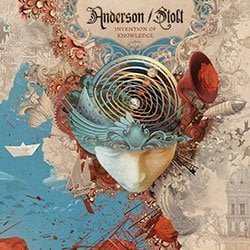
Anderson/Stolt Invention Of Knowledge
“I don’t think it’s a responsibility, it’s a pleasure to be able to sing about things that everyone knows and gets and sees and understands because when all is said and done we all want the same thing.”
You mentioned earlier other creative outlets such as painting and story writing. Do you channel all the same feelings into those as well?
“Probably, but a lot of it is to do with the idea of just creating something. Like a gardener will go into the garden and create with plants and trees and flowers I co-create with the energy that surrounds me. Music and paintings and art and storytelling, I just do it because I enjoy it and it’s very relaxing and it’s part of my life and I think there’s millions of people doing exactly the same thing.”
Is there any weight on you to release records or play certain songs live?
“Not really, all I’m thinking about is new music. I’m actually writing some today, news songs that I think are very important to me. I want to perform them well and I’m practising them so that when I get together with Trevor and Rick we will all co-create together.”
Do you have a specific songwriting ambition left to achieve?
“It’s unbelievable, I can’t even start to tell you. The doors are wide open and I’m just charging through very excited and creating ideas all the time. I must have at least 20 albums in my head ready to release. I’m just going to take my time and be patient.”
It doesn’t sound as though the music industry has dampened your spirit in any way?
“No it doesn’t bother me one bit. One minute they love you the next minute they don’t care about you, so what! I’m not interested in what they think. I’m more interested in creating music and knowing that somebody out there is going to enjoy it.”
Therefore when you’re releasing a new album like Invention Of Knowledge what are your hopes for it?
“Well it’s got great reviews so I just hope a lot of people are able to get hold of it and I’m looking forward to putting the vinyl on my record player. I’m just very excited to release something that is part of my ongoing life experience.
“I think the interesting thing about this album is that you can play it over and over again. I play it in my car and I keep hearing all the different musical ideas that I didn’t hear before. Roine did an incredible production.”
Will you and Roine be going out on tour together?
“That I do not know. We’d like to and have talked about doing some concerts next summer but it depends on how well the album is received and if promoters are interested in putting on a show. That’s called show business and we’ll see what happens”.
Interview: Duncan Haskell
Invention Of Knowledge is out now, for more information about the album and all of Jon’s other pursuits check out his website jonanderson.com



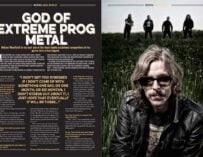
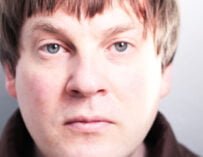
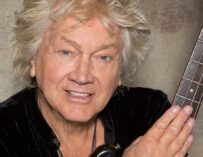
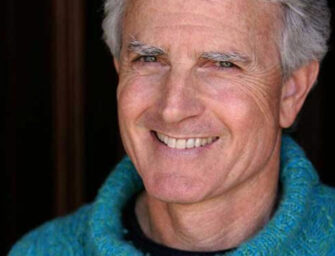

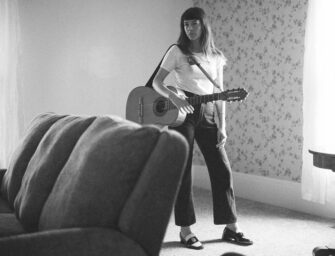
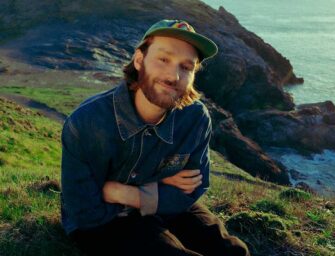
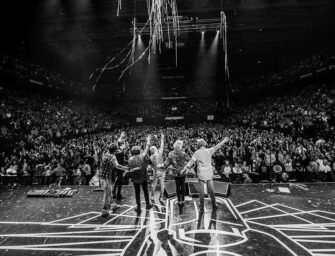






















It just astounds me that two great musicians can trade ideas over the internet and create such a wonderful piece of music. Technology is a wonderful thing when used for “good”.